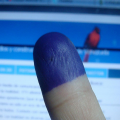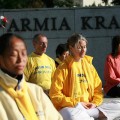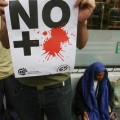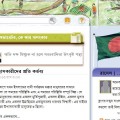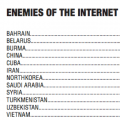Stories about Human Rights from April, 2013
AFTE Releases Legal Guide to Digital Security for Arab Human Rights Activists
The Association for Freedom of Thought and Expression, in Egypt, issued a “legal guide to digital security” as part of its digital freedoms programme. The guide was produced for campaigners and human rights activists and lawyers interested in freedom of digital expression and the confidentiality of communications and information stored on mobile phones, computers or any other device used to store or distribute data or information
Will the Revolution Still be Tweeted? Venezuela's Netizens Face Uncertain Future
Since the death of Hugo Chavez and narrow victory of Nicolas Maduro in Venezuela, two social media users have been arrested for posting information deemed “destabilizing” to the country. On election day, the Internet was briefly shut down throughout most of the country. And today, social network users are facing threats to their employment status, as authorities search profiles for signs of political affiliation that have, in several cases, resulted in users losing their jobs.
Human Rights Verdict Could Affect Cisco in China
In 2011, two separate lawsuits were filed against Cisco Systems alleging that its technology enabled the government of China to monitor, capture, and kill Chinese citizens for their views and beliefs. To what extent are these human rights violations attributable to technology provided by Cisco?
Mexico: Another Voice Goes Silent [UPDATE]
A social media user known only as Valor Por Tamaulipas recently announced plans to close Facebook and Twitter accounts that have become popular sources of information on drug violence in northern Mexico. Valor por Tamaulipas (Courage for Tamaulipas) has been using social media to crowdsource reports from citizens in the state of Tamaulipas, which has been riddled with drug-related conflict and corruption since 2006.
The Psychological Strains of Digital Activism
Iran's Green Movement marked one of the first large-scale movements where new media served as a platform for coordination and communication between activists and played a vital role in showing the world what was happening on the ground. The post offers a first-person narrative on this experience from Cameran Ashraf, an Iranian-American citizen living in the United States who helped facilitate communication and information exchange for activists and protesters during this period.
Venezuela: Internet blocked for “three minutes” on Election Day
Late on Election Day in Venezuela on Sunday, April 14, Internet access through the country's primary service provider CANTV was interrupted for about twenty minutes according to users' declarations and for "no more than three minutes" according to the authorities.
Chadian Blogger Detained
Internet Without Borders reports that Jean Laokolé, a Chadian blogger and writer, was arrested on March 22 by security forces in N'Djamena, Chad's capital. In a petition released today, the advocacy group calls for the blogger's "immediate and unconditional release." Laokolé writes under a pseudonym for one of Chad's most popular blogs, where he covers corruption and other problems in politics.
Facebook's Graph Search: Be Careful What You “Like”
Facebook's new Graph Search tool allows strangers -- anyone from casual acquaintances to government actors -- to discover information about you that you may not have intended them to find. This post explores the impact of this new tool on users and offers a few ideas on how to keep your information from becoming public without your consent.
Bangladesh: Global Voices Condemns Assault on Bloggers
The Global Voices community, comprised of bloggers, writers, and activists from more than 100 countries, wish to express our concern about the current state of freedom of expression online in Bangladesh. We call for the immediate release of detained bloggers and urge government actors to uphold their commitments to national law and international human rights doctrine.
Accused of Blasphemy, Three Bloggers Detained in Bangladesh
The Detective Branch of Bangladesh Police has detained three bloggers- Rasel Parvez, Mashiur Rahman Biplob & Subrata Adhikari Shuvo yesterday night for their alleged write-ups demeaning Islam and Prophet Muhammad. Since yesterday the community blogging platform Amarblog.com has become inaccessible from Bangladesh. It is yet to be known whether the authorities have blocked it and why.
Bangladesh Authorities Go After Bloggers, Claim They Are ‘Anti-Muslim’
As deadly clashes between Islamist activists and authorities continue to escalate religious tensions in Bangladesh, the country's telecommunications authority is making moves to silence bloggers deemed anti-Muslim or anti-state. Award-winning blogger Asif Mohiuddin has become the latest target.
Saudi Arabia Threatens to Block Skype and WhatsApp
Saudi Arabia is threatening to block a number of popular communication tools, such as Skype and mobile messaging service WhatsApp, unless the operating companies agree to infringe on the privacy of users and monitor them.


